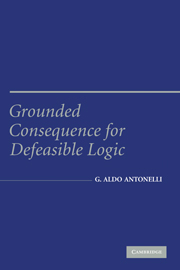3 - General Extensions for Default Logic
Published online by Cambridge University Press: 18 July 2009
Summary
INTRODUCTORY REMARKS
In this chapter we further develop the basic three-valued approach to defeasible inference by introducing a notion of “general extension” for Default Logic that falls in line with the analogous notion for nonmonotonic networks introduced in Chap. 2. To an extent, the present work can be viewed as a vindication of the skeptical approach to defeasible inheritance of Horty et al., without at the same time underestimating its indebtedness to the results of Fitting (1990, 1993), Przymusiński (1991), and Przymusińska and Przymusiński (1994) in logic programming.
As will be clear, such a notion of general extension provides a generalization of the notion of extension for Default Logic that was originally due to Reiter (1980). The two versions differ mainly in the way conflicts among defaults are handled. Characteristically, the present notion of general extension allows defaults not explicitly triggered to preempt other defaults. A consequence of the adoption of such a notion of extension is that the resulting framework turns out to be mathematically well behaved, in that the collection of all the general extensions of a default theory has a nontrivial algebraic structure. This fact has two major technical fallouts: First, it turns out that every default theory has a general extension; second, general extensions allow one to define a well-behaved, skeptical relation of defeasible consequence for default theories, satisfying the principles of Reflexivity, Cut, and Cautious Monotonicity formulated by Gabbay (1985) (see Section 1.2).
- Type
- Chapter
- Information
- Grounded Consequence for Defeasible Logic , pp. 59 - 85Publisher: Cambridge University PressPrint publication year: 2005



